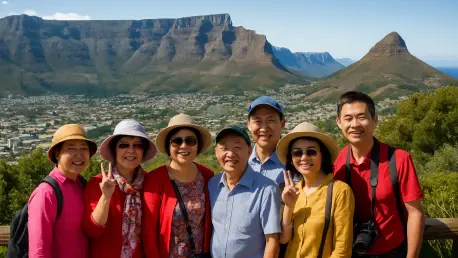In a world where global tourism continues to reshape local economies, Cape Town stands at the forefront of innovation by targeting one of the most lucrative travel markets—Chinese outbound tourists, who spent an estimated $250 billion globally last year, as reported by the UN World Tourism Organization. With only a small fraction of these travelers, roughly 41,651, visiting South Africa in the past year, the city sees vast untapped potential. Under the leadership of Alderman James Vos, the Member of the Mayoral Committee for Economic Growth, Cape Town has launched an ambitious digital marketing campaign that recently achieved over 20 million impressions on WeChat, China’s dominant social media platform, with a modest budget. This early success signals a promising opportunity to elevate the city’s profile among Chinese travelers, whose numbers are projected to grow significantly in the coming years, offering a substantial boost to the local economy through increased tourism revenue.
Targeting High-Growth Markets
Unlocking the Chinese Travel Boom
Cape Town’s strategic focus on the Chinese market is driven by the sheer scale of outbound travel from China, which far surpasses other nations in expenditure. A recent trade mission to Shanghai, led by Alderman Vos and supported by Wesgro, emphasized the city’s diverse attractions—from stunning landscapes to vibrant cultural experiences—as key selling points to attract this demographic. Engaging with South African Tourism and potential investors during the mission, alongside participation in the Shanghai Global Food Trade Show, highlighted a multi-faceted approach to building partnerships. The goal is clear: to capture a larger share of the 100 million Chinese travelers venturing abroad annually. By showcasing what makes Cape Town unique, the city aims to transform its visitor economy, leveraging the spending power of this market to fuel growth in hospitality, retail, and other sectors that thrive on tourism.
Expanding Digital Footprints in China
Beyond initial successes on WeChat, Cape Town is broadening its digital presence by tapping into other prominent Chinese social media platforms. This expansion includes creating a rich library of Chinese-language content such as articles, brochures, and videos tailored to resonate with potential visitors. Research from China Trading Desk reveals that Chinese travelers heavily rely on social media for travel inspiration, seeking authentic insights into destinations. This behavior underscores the importance of a robust online strategy that prioritizes culturally relevant and engaging content. By aligning marketing efforts with these digital habits, the city hopes to connect with tech-savvy travelers who value immersive, community-driven experiences, ultimately driving higher visitor numbers through targeted and impactful online campaigns.
Diversifying Tourism Strategies
Parallel Push into the Indian Market
In tandem with efforts in China, Cape Town is intensifying its outreach to another significant outbound travel market—India. A recent campaign in this region achieved an impressive 130 million impressions, reaching 68 million people over a span of several months, complemented by high-visibility billboard advertising in Mumbai. This dual focus on India and China is bolstered by South Africa’s Trusted Tour Operator Scheme (TTOS), implemented by the Department of Home Affairs. Forecasts suggest that combined outbound travel from these two countries could reach 240 million by 2028, presenting a golden opportunity for the city. The TTOS is expected to streamline travel processes, encouraging both first-time and repeat visitors to explore Cape Town’s offerings, thereby amplifying the economic impact of international tourism.
Economic Impacts and Future Growth
The economic benefits of tourism are already evident in Cape Town, where domestic and international visitors supported over 106,000 local jobs in the past year, according to Alderman Vos. Expanding into high-growth markets like China and India holds the promise of sustaining thousands more jobs, cementing tourism as a cornerstone of the local economy. The shift toward digital-first, culturally tailored marketing strategies reflects a broader trend of adapting to the preferences of tech-reliant travelers who prioritize authenticity and local engagement. As Cape Town refines its approach, the potential for significant growth in visitor numbers becomes increasingly tangible. Looking back, the city’s proactive steps in embracing data-driven campaigns and fostering global partnerships have laid a strong foundation for sustained economic progress and job creation through tourism.









